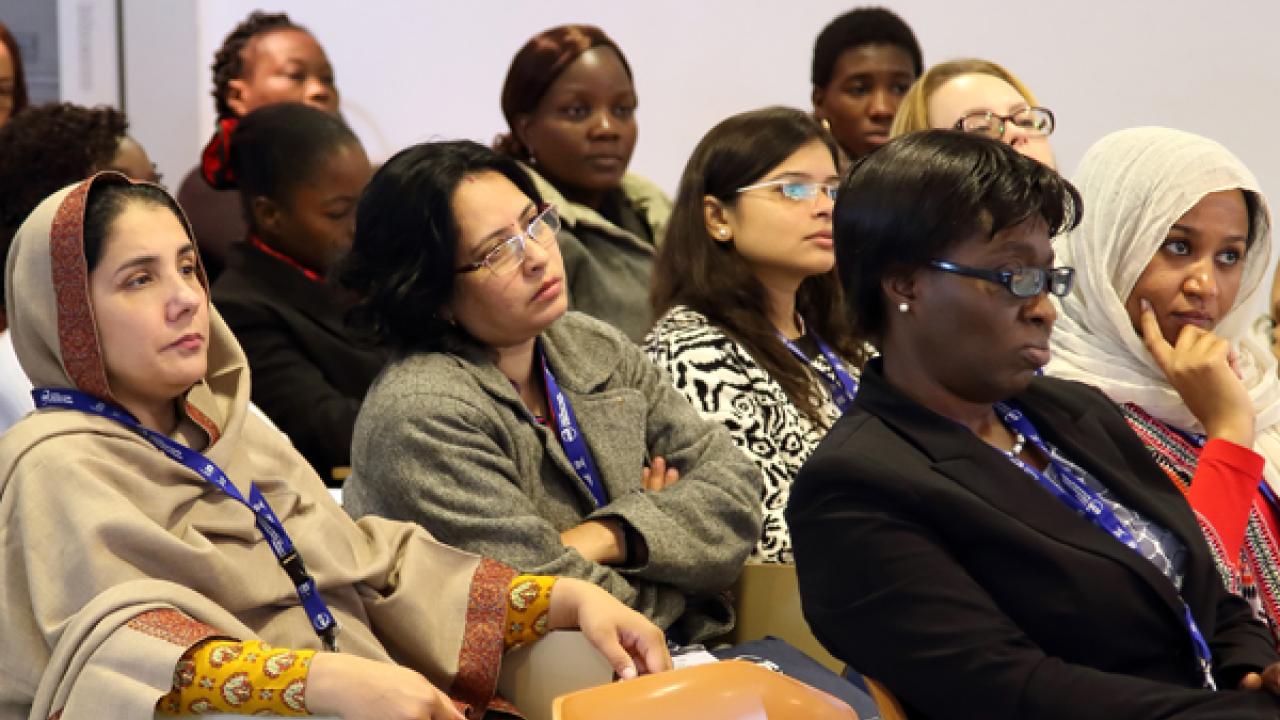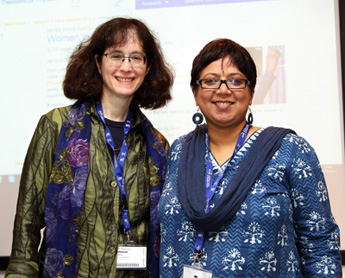
From writing scientific articles to balancing the demands of family and career, ICTP's second Career Development Workshop for Women in Physics, which took place from 12 to 16 October 2015, offered practical advice as well as inspirational talks to some 50 participants from 26 countries.
See photos from the opening session of the workshop on ICTP's Flickr page.
The main goal of the workshop was to convene women physicists from around the world to share their thoughts and learn from each other's experiences. Worldwide, women continue to face daunting challenges: according to an international survey of women and men physicists published by the American Institute of Physics in 2012, women physicists lack the equivalent access to career-advancing resources and opportunities that their male colleagues enjoy. Other results of the survey indicated that having children tends to slow the career progress of women physicists but not that of their male counterparts.
The workshop was the second such activity supported by ICTP (following on a first one held in 2013), as part of its efforts to increase the participation and representation of women in physics at the Centre and beyond. Both workshops have been under the direction of physicists who are committed to supporting women in science: Shobhana Narasimhan, a Professor of Theoretical Sciences and Dean of Academic Affairs at the Jawaharlal Nehru Centre for Advanced Scientific Research in Bangalore, India; and Elizabeth Simmons, Dean of Lyman Briggs College and University Distinguished Professor of Physics in the Michigan State University Department of Physics and Astronomy. They organized these workshops together with ICTP scientist Erika Coppola of the Centre's Earth System Physics section.
ICTP spoke to Narasimhan and Simmons about the current state of gender balance in physics, the aims of the workshop, and how institutes like ICTP can help improve the prospects for women in physics.
 |
| Workshop co-directors Elizabeth Simmons (left) and Shobhana Narasimhan |
What do you hope participants will gain from this workshop?
Simmons: We hope they will gain several things. The most obvious are the skills we covered during the workshop--choosing research problems, creating a CV, negotiating--but beyond that, we hope they will also gain a greater sense of pride and confidence in their abilities, and a sense that there is a broader community of women in physics worldwide that they are part of.
Narasimhan: I think there are also intangible things like self confidence, courage, entitlement. It is hard to measure some of these things, but people have said from past workshops and already from this one that they feel validated, that they feel empowered, and I think that is what we are aiming for.
What problems do women in physics face that they may not face in other fields?
Simmons: Part of it is the extreme scarcity of women in physics, it makes everything more difficult. In biology it is more likely that there would be some other women in your department, or in your class if you are a student, but in physics you may spend all your time as the only woman in the room, and that means if people don't believe that women should be there you may have no one to study with, you may have no one to read your grant proposal and give you feedback.
Narasimhan: I think physics suffers from gender stereotyping more than other fields. People are OK with the idea of women doing biology, but at some deep visceral level there is something weird about a woman doing physics, and so many of the women in the workshop have said that classmates make fun of them, and say "Oh, what are you doing studying physics, why don't you get married," or, "You are studying physics--you will never find a husband," and things like that, and I think that probably happens less in other fields.
Do women from developing countries face greater challenges than their counterparts in developed countries?
Narasimhan: One thing that has come out from workshop discussions is that it is the same for women everywhere. It is difficult everywhere, women face pretty much the same problems everywhere and we have much more in common than we have different. For example, Liz (Elizabeth Simmons) and I both met at Harvard when we were in graduate school, we were both in classes which were almost entirely male, and we've done our careers on opposite ends of the world--me in India, she in the US. We meet once every few years and we share experiences, and on the whole they are very similar. Sometimes perhaps the problems that are raised by society are a little bit harder for women; some women are in parts of the world where it is really not accepted by society for women to work or to go out of the house. In extreme cases you even hear of women getting death threats for working or for encouraging other women to study, so those kinds of things can be there, but on the whole I think the surprising thing is that it is pretty much the same thing all over the world.
Simmons: Where it looks like there are differences, there are differences because of time: we are experiencing the same things but at slightly different times. So what they experience now I remember from a few decades ago, but things are a bit better in the States now, so I think they will get better in the developing world, but we're just separated by time. One thing that women from developing countries have pointed out as a challenge is the lack of equipment and the lack of resources that makes their work that much harder. They may have an idea for an experiment but can they get the necessary equipment?
Narasimhan: If you look at the percentage of women in physics it's not always higher in the developed world than the developing world, like Turkey has a rather high percentage of women in physics, Argentina has a high percentage of women in astrophysics, and Japan, which is a very developed country, comes in somewhere near the bottom.
Can you describe some positive developments for women that have come about over the past two decades?
Simmons: More people have recognized that it's a problem having so few women in physics, they are recognizing that we are wasting talent, and they started to pay attention to making broader university policies work better for all people. They are thinking, maybe the way we hire and train people is not good for everybody, maybe it's been tailored to be good for just men from a certain background, and so starting to fix that makes it better for everybody over time.
Narasimhan: Governments and institutions around the world have formally begun to recognize that the lack of women in science is a problem. Together with that is this spreading culture of political correctness; people make fun of that sometimes, but at the same time it is a good thing because people are beginning to realize there are certain things they just cannot say. Thirty years ago people would say things that were really unacceptable and now they realize if they say them they will get into a lot of trouble.
What can science institutes like ICTP do to help?
Narasimhan: They are doing the right things; they are encouraging women to attend scientific activities, as well as having special workshops like this one targeted specifically to women. I think you need both of these things, and you need to target men as well, to make them more aware of these issues and more involved in changing the situation.
Simmons: We are very grateful that ICTP is so supportive, their support and making the facilities available is just wonderful, it's really progressive and much ahead of what other institutions are willing to do.
















